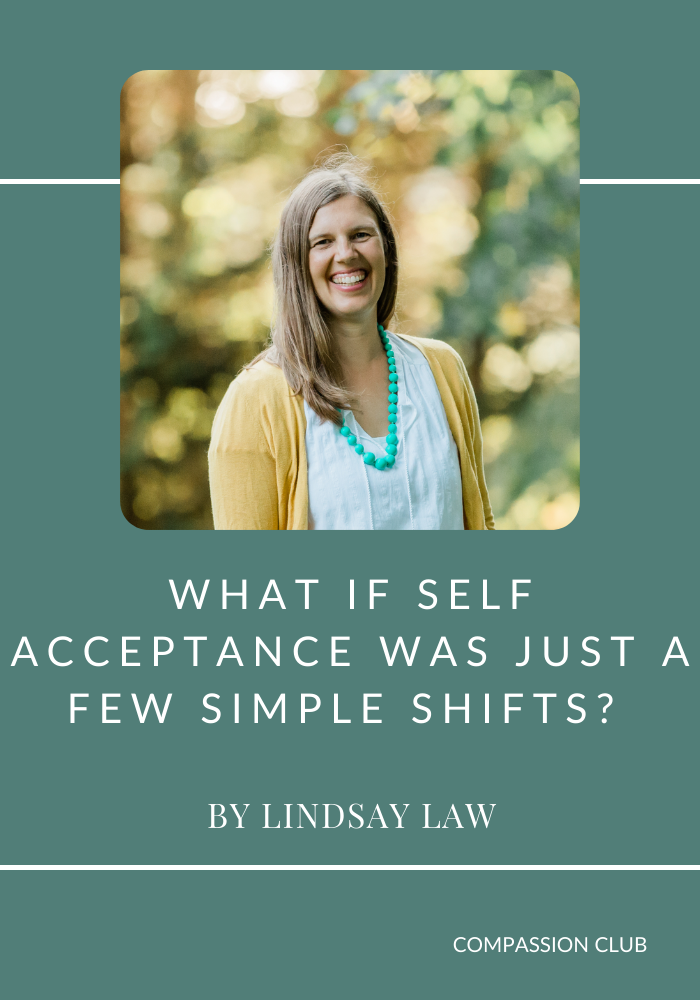THE COMPASSION CLUB
What if Self Acceptance was just a few simple shifts?

What if Self Acceptance was just a few simple shifts?
You’ve probably been told to “Be Positive”, “Love yourself”, “Be the real you”
But how do you actually do it?
The key to all of these things is to get to a place where you truly accept yourself.
All of you.
Not just the good parts and the fun parts, but all of you.
The you that makes mistakes, the you that feels unmotivated, the you that wants your sister to just go away.
When you are able to accept yourself exactly where you are, you will be in a place where you can be more positive, truly love yourself, and allow the real you to shine through.
So, then of course the question is, “How do I truly accept myself?”
I’m going to teach you three ways that your brain may be automatically rejecting you and how you can shift your response to self acceptance. This is What if Self Acceptance was just a few simple shifts?
1. Start really seeing and hearing yourself and let go of fixing yourself
Your brain is designed to look for problems and to keep you safe. You can be thankful for that and appreciate that amazing role of your brain, AND also recognize that sometimes it’s not helpful. You don’t always need to be fixed. Uncomfortable feelings do not always mean danger. Things that happen don’t always have to be a problem.
Let’s take an example.
You find out that a few of your friends got together without you.
Your brain fills in the information gaps by telling yourself that they probably don’t really like you.
You feel rejected.
You don’t like the way it feels, so you try to fix it by pushing the feeling down by eating a huge bowl of ice cream, or fix it by reacting and telling yourself that they weren’t very good friends anyway. By doing this, you send a message to yourself that there is something wrong with you and that feeling rejected is not ok.
What if feeling rejected is ok? What if you could really see yourself in that moment and say, “Of course I’m feeling rejected right now.” It’s understandable that when I’m thinking that my friends don’t really like me that I’d feel rejected. It’s ok for me to feel rejected right now. It feels a little tight in my tummy. That’s ok. That’s what rejection feels like for me right now. This response sends a message to yourself that you are ok, there is nothing wrong with you and what you are feeling is acceptable.
From this place of acceptance and understanding of yourself, you will be in a better place to be the friend you want to be in this situation and think positive things about yourself.
2. Focus on your Learning and Growth instead of Results
Your brain loves things to be easy and simple. It’s either wrong or right, good or bad, or success or failure. It doesn’t like to see anything in between. It requires more energy from your brain. And it also makes things tricky when it comes to self acceptance. Your brain may only be seeing success in one specific way and rejecting all other options.
Let’s take another example.
You had a goal to be on the volleyball team and you didn’t make the second cut.
Your brain will want to look at the end result and say you failed. It’s just so much easier for your brain to make that conclusion.
You wanted a certain result, you didn’t get it, so therefore you failed.
But, what if you focused on learning and growth and the process instead of just the end result?
What if your definition of success was more broad and accepting.
Focusing on the end result in certain experiences in your life may have you rejecting yourself more often than you’d like.
To focus more on learning and growth you might want to ask yourself:
“What did I learn about me from trying out for the volleyball team?”
“Who did I meet that I am so glad I met because of this experience?”
“What do I want to do differently, if anything, next time?”
These questions help you to focus on the process and learning to work towards your goal, instead of just the end result. This allows your brain to accept you no matter what the outcome, because the end result was not the most important part of this goal. The most important part was who you were becoming in working towards that goal.
What if you define success as being willing to try, not giving up, being kind to yourself no matter the outcome, or always learning from the experiences before you.
Would that feel more accepting?
There is so much more to you than did you or did you not {insert your goal}.
3. Move into Curiosity instead of Judgment
Your brain has this amazing ability to take in information and make decisions. Part of this ability means making judgments. And because your brain is so good at looking for problems, it often leans towards negative judgments and negative and unhelpful conclusions about yourself. This makes accepting yourself a little bit harder.
The good news is that you can shift your brain to intentionally get curious instead of judgmental. Being curious about your thoughts, feelings and actions is a much more accepting approach.
Again, let’s see what this looks like in an example.
You gossiped about a friend.
You feel badly about what you said and your brain starts dishing out judgements.
“You are such a mean person”
“You do not deserve to be her friend”
“What is wrong with you?”
These thoughts and judgments are creating a feeling of rejection of you as a person.
You are going to make mistakes in life. Everyone will. And if you are able to come to these moments with curiosity, it will be far easier for you to accept and love all of you. You are lovable even when you make mistakes.
So what would curiosity look like? Here are some examples:
“I wonder why I said that? What was I feeling that led me to say that?”
“Is there something that I can do to mend this situation?”
“What am I believing about myself that contributed to this action?”
This approach accepts that you will make mistakes sometimes and that does not mean that you are a bad person. No one is all good or all bad or always kind or always mean. When you are kind and accepting of yourself when you do make a mistake, you are far more likely to show up as the person you want to be in the future.
So friends.
Three intentional shifts that you can make when your brain goes to its unhelpful default of rejecting you. It’s just doing its job, but you can intentionally create self acceptance. And through that self acceptance it will be far easier to follow the advice of being positive, loving yourself and being the real you! You’ve got this!
And teens, if you want to remind yourself of these simple shifts to accepting yourself, get a small wall poster here.
And if you’re a parent or an educator and you want to see how you can apply these principles to create an environment that supports self acceptance and connection for the youth in your life, see my other blog post here.
MEET THE BLOGGER

Lindsay is a mom of 6 (4 of whom are teens or tweens), business owner and adventure junkie. As a Certified Youth & Parent Life Coach she helps youth embrace confidence and self love to live more abundant lives, and avoid perfectionism and self harm. She also supports parents in creating a home environment that supports their teens’ self love journey. She loves hanging out with her teens, biking, traveling and learning. With a window into the teenage brain as a mother and coach, she has unique insights into communicating with teens to promote confidence for all.
Website- youthrisingcoach.com
IG- @youthrisingcoach
FB- Youth Rising
YouTube- https://www.youtube.com/channel/UCQxUkLKT8Itb9tFstz29TxQ?view_as=public
Self Acceptance Freebie- https://www.youthrisingcoach.com/selfacceptance
Parents and Educators- https://educationempowermenthub.com/blog/communicating-with-your-teens